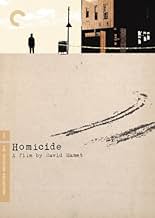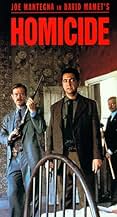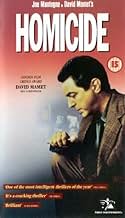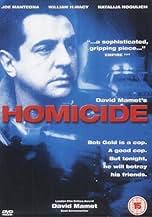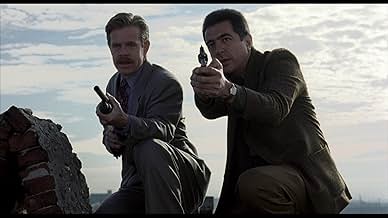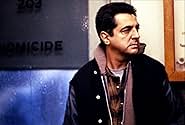Homicide
- 1991
- Tous publics
- 1h 42min
NOTE IMDb
6,9/10
8,7 k
MA NOTE
Ajouter une intrigue dans votre langueA Jewish homicide detective investigates a seemingly minor murder and falls in with a Zionist group as a result.A Jewish homicide detective investigates a seemingly minor murder and falls in with a Zionist group as a result.A Jewish homicide detective investigates a seemingly minor murder and falls in with a Zionist group as a result.
- Réalisation
- Scénario
- Casting principal
- Récompenses
- 3 victoires et 6 nominations au total
Avis à la une
A big-city police detective, Joe Mantegna, who always ignored and downplayed his Jewish heritage, finds himself forced to examine his values after being pulled off what he considers an important case, at the request of influential Jewish citizens, to investigate the death of an old Jewish storekeeper, who might have been the victim of anti-Semitic violence. This film isn't without its flaws, but writer/director David Mamet deserves a great deal of credit for having the courage to present a number of provocative questions about what it means to be a Jew in an often hostile society. The film can also be applauded for not offering any simple answers. Usually in Hollywood movies, characters are rewarded for returning to their roots. In "Homicide," the reverse is true as Mantegna soon finds his life spiraling out of his control. The drama is always compelling, if somewhat heavy-handed and implausible at times. More importantly, the Mametisms which increasing mar his work, i.e., scripts where every character speaks in exactly the same voice, and big roles for non-talented wives, are kept in check here. This is my favorite Mamet film.
I am a huge fan of Mamet and there's an excellent cast - even the mighty Roger Deakins as DOP. But this movie doesn't work. The dialogue is stilted and forced - surely the last thing you'd expect from a Mamet script - the main character is weak and not credible as a detective. The plot is all over the place and the ending highly unsatisfactory.
While this picture could compare favorably with many of its type for nothing more than its use of action, suspense and realistic details regarding police work, it goes significantly further and becomes a character study of a man searching for an identity. A conscientious, no-nonsense detective, Gold has never become involved in his work to the extent that it has made him question his values, let alone his reason for existing. Without the point being forced upon us, we see a character with (seemingly) no home, no friends, no social activities: a decent man who has not connected with anything meaningful in life until circumstances force him to make significant choices.
Especially challenging to the viewer is the deliberately ambiguous ending in which there is reason to believe that Gold could choose either of the major alternatives available to him. He looks and feels like an outsider in the precinct. He now identifies with the Jew as an outsider. Could it be that he is actually considering.....?
See this provocative picture, and decide for yourself. Excellent performances and direction throughout.
Especially challenging to the viewer is the deliberately ambiguous ending in which there is reason to believe that Gold could choose either of the major alternatives available to him. He looks and feels like an outsider in the precinct. He now identifies with the Jew as an outsider. Could it be that he is actually considering.....?
See this provocative picture, and decide for yourself. Excellent performances and direction throughout.
Give me Joe Mantegna and William H. Macy as partners and I'll guarantee that there will be a movie worth watching. Macy has been moving up the chain, and is brilliant here.
The whole issue of Jewish persecution is woven in the story, and Mantegna is conflicted because he is Jewish, but obviously not a practicing one. As things go, his Jewishness is challenged by the investigation. "You say you are a Jew, and you can't read Hebrew. What are you then?" He is finally confronted with the reality of hate and his role as a cop takes second place to his Jewishness.
It is about realizing that he is nowhere until he finds out who he really is. The language of the police is raw and brings everything out into the open. Detective Gold (Mantegna) doesn't find himself at the end of the film. He has a ways to go, but now he has a direction.
The whole issue of Jewish persecution is woven in the story, and Mantegna is conflicted because he is Jewish, but obviously not a practicing one. As things go, his Jewishness is challenged by the investigation. "You say you are a Jew, and you can't read Hebrew. What are you then?" He is finally confronted with the reality of hate and his role as a cop takes second place to his Jewishness.
It is about realizing that he is nowhere until he finds out who he really is. The language of the police is raw and brings everything out into the open. Detective Gold (Mantegna) doesn't find himself at the end of the film. He has a ways to go, but now he has a direction.
Not that I thought Joe was incapable of acting, but it's a little hard to take a guy seriously after seeing them in junk like "Baby's Day Out." Nevertheless, he gives a wonderful performance in this very intriguing film that was written and directed by "The Spanish Prisoner's" David Mamet.
Like "The Spanish Prisoner", "Homicide" is a movie that must be paid attention to at all times or you will miss tiny, but very important details. I will admit that I missed a few of these details, but since I watched it in a film class, we discussed it the next day and other people pointed them out. Anyway, this style of work seems to be David Mamet's "signature" and I think it's great. I hope he wins an award some day.
Getting back to the movie, besides containing numerous small details, "Homicide" is a genuinely interesting story about a Jewish cop who has gotten out of touch with his religious side. It is only after he is assigned to a case involving a murdered Jewish woman, does he finally began to get in touch with his roots. Of course there is struggle, not to mention people who do not appear to be what they seemed. It's a good movie, though a little hard to get into at first, but don't let your mind wonder, or you could be missing a vital element to the plot.
Like "The Spanish Prisoner", "Homicide" is a movie that must be paid attention to at all times or you will miss tiny, but very important details. I will admit that I missed a few of these details, but since I watched it in a film class, we discussed it the next day and other people pointed them out. Anyway, this style of work seems to be David Mamet's "signature" and I think it's great. I hope he wins an award some day.
Getting back to the movie, besides containing numerous small details, "Homicide" is a genuinely interesting story about a Jewish cop who has gotten out of touch with his religious side. It is only after he is assigned to a case involving a murdered Jewish woman, does he finally began to get in touch with his roots. Of course there is struggle, not to mention people who do not appear to be what they seemed. It's a good movie, though a little hard to get into at first, but don't let your mind wonder, or you could be missing a vital element to the plot.
Le saviez-vous
- AnecdotesThe film began as an adaptation of David Mamet's friend William J. Caunitz's 1986 novel "Suspects". However, the more Mamet wrote, the more his story diverged from the source material until, with Caunitz's blessing, Mamet left the source book behind entirely, until ultimately the script became an original screenplay.
- GaffesWhen Detective Gold discovers the photo behind the picture, in the picture is a Hebrew sign referring to a road being built by the Labor Federation's (haHistadrut) Solel Boneh division. In the sign it's misspelled "Vistadrut - Solel Bono".
- Citations
Tim Sullivan: Bob, I'm gonna tell you what the old whore said, and this is the truest thing I know: "When you start cumming with the customers, it's time to quit."
Meilleurs choix
Connectez-vous pour évaluer et suivre la liste de favoris afin de recevoir des recommandations personnalisées
- How long is Homicide?Alimenté par Alexa
Détails
Box-office
- Montant brut aux États-Unis et au Canada
- 2 971 661 $US
- Week-end de sortie aux États-Unis et au Canada
- 43 650 $US
- 14 oct. 1991
- Montant brut mondial
- 2 971 661 $US
Contribuer à cette page
Suggérer une modification ou ajouter du contenu manquant



